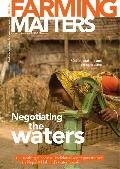As I am writing this editorial, Pakistan is being hit by the most serious floods in 180 years, while Russia suffers from an unprecedented drought. Unequal distribution of water is not new, but the ferocity of fluctuations and contrasts between situations is.
Water is being referred to as the new oil, even though there are a few crucial differences that need to be highlighted. First, water is a resource that every living being needs in order to survive. Hence it has much more than an economic value. Access to water is a basic human right. Yet we have to manage with a limited amount of water. Here is where the water challenges lie.
Agriculture is the biggest user of water, and modern technology has made agriculture thirstier. But even more water is needed if we are to increase production for a growing population. So how do we increase the efficiency of water use in agriculture? There are two major routes to more efficient use:
- stop over-exploiting water from concentrated sources, and
- improve the use of rainwater.
There is a big potential here, keeping in mind that 70% of agriculture in the world is rainfed, and that there is still much local water wisdom waiting to be uncovered and given a boost.
But as this issue of Farming Matters shows, efficient use of water is about much more than adapting agricultural methods. Being a finite resource means that struggles for water are bound to happen, within households, within and between communities, watersheds, countries and regions. Last month we visited some Maasai villages in southern Kenya together with our partner organisation, ALIN. We met community leaders who complained about the fact that entrepreneurs had started floriculture projects in their area, resulting in an increased shortage of drinking water for their cattle. This is just one out of a myriad of examples of competing claims for water.
Building new systems of water governance and learning from age-old systems are the key to a balanced and inclusive development of agriculture. This issue of Farming Matters shows practical experiences and background information on how negotiation for water happens in different parts of the world. It provides examples of local solutions to global challenges and aims to stimulate you to reflect on what happens in your area!
Text: Edith van Walsum, director ileia

